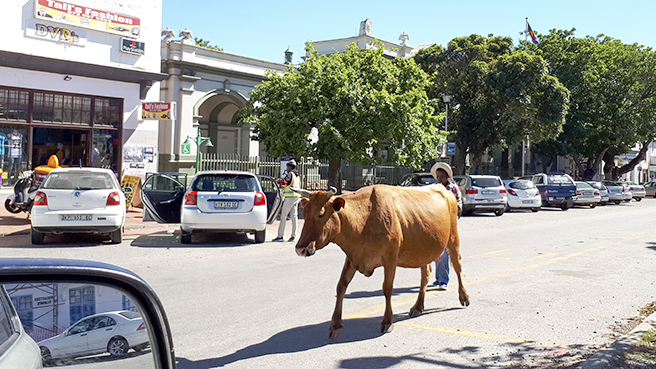The Zuurveld hasn’t felt the full extent of the drought yet, but farmers in this part of the Eastern Cape will be selling off masses of stock in the next few weeks unless it rains very soon. That’s the prediction of Paul Hobson, a partner in livestock sales specialists Hobson & Co.
Impacting on farmers right now is ban on imports of meat from South Africa by neighbouring countries as a results of the foot and mouth outbreak in Limpopo. “That’s had a knock-on effect in that the big feedlots aren’t buying our calves,” Hobson said.
The danger of local livestock being infected by foot and mouth was next to nil, Hobson said, given the strict controls and how far the affected area is from the Eastern Cape. “It’s the blanket ban that’s hitting us.”
Because of the risk of introducing and spreading diseases and parasites during international trade, countries including South Africa have restrictions on animal imports. The international Organisation for Animal health (OIE) gives official recognition for countries or zones free from Rinderpest, Contagious Bovine Pleuropneumonia (CBPP), Bovine Spongiform Encephalopathy (BSE) and Foot and Mouth Disease (FMD).
South Africa FMD-free status is crucial for foreign exchange earnings, job creation, focal economic development, food chain development and keeping rural areas optimally utilised for various agricultural activities and game farming, our country’s policy on the disease states.
Neighbouring countries Namibia, Botswana, Swaziland, Mozambique and Zimbabwe this month banned the import of meat from South Africa. The country temporarily lost its FMD-free status when two animals in Limpopo tested positive for the disease at the beginning of the year.
The Red Meat Producers Organisation (RPO) in a statement on 18 January said, “The animals have been found just outside the controlled area in the northern part of Limpopo. These two animals have effectively ended South Africa’s FMD free zone status and there is no indication of the disease occurring in any other part of the country.”
The Department of Agriculture, Fisheries and Forestry (DAFF) this week announced strict control measures and said it was working with industries to motivate the resumption of trade in safe products. The Department says controls include that no live cloven hooved animals may be moved within the area affected by foot and mouth disease (FMD) in Vhembe District.
The RPO’s Koos van der Ryst said the control of FMD was critical between countries which are producers of livestock.
“FMD is an exclusively animal disease and it has no impact on human health,” he emphasised.
“If the process of containing the disease is successful, South Africa may be able to retrieve its FMD free zone status within a year.”
The FMD outbreak comes at a time when the industry is suffering from a countrywide drought, the RPO noted. Not only had feed and maize prices escalated but the consumer’s purchasing power was also under pressure.
“This is in the midst of a herd rebuilding phase after the 2016 drought. All these factors put the producers’ cash flow and financial survival under pressure,” the RPO said, emphasising that everything must be done to retrieve South Arica’s FMD-free status.
“All indications point to the fact that the most of South Africa’s trade partners are not going to accept meat imports from the country. Accordingly, we must accept that the estimated 4.02% beef and 0.69% sheep meat ear-marked for exports will be taken up in the local market. This may result in consumer prices moving sideways and even downwards. This scenario will obviously be catastrophic for producers who are already under financial pressure.”
Full effect yet to come
On the local front, Hobson believes the full effect of the drought is yet to come.
“There is still a demand for animals,” Hobson said. “We’re not really over the last drought, so we’re in an undersupply situation.”
At the company’s sale in Grahamstown on 17 January, 591 sheep and goats and 273 cattle were on offer. “Prices were very good, considering the crash in the market for weaners,” the company reported on their website. Good quality slaughter cattle had achieved R20-plus and store cows averaged around R17.50.
Hobson said they were pleasantly surprised at prices achieved at their first sale of the year – “so we have hope”.
“We’ve come through a very exciting year,” he said. “We’ve made huge strides in getting new farmers, particularly from across the Fish River. They’re supporting our sales well. Up to 50% of our stock is small farmers.
Breeding stock
Currently, farmers are stocking up on breeding stock of cattle and sheep, Hobson told Grocott’s Mail. “When there’s no demand is when we’ll know the drought has really struck.”
What he has observed is an increase in lending and asking for advances. “Agriculture is at a critical point at this stage.”
The relief farmers might enjoy from regional exports had been stymied by the Limpopo foot and mouth outbreak.
“Foot and mouth has closed our borders, so the window of opportunity to export into the rest of Africa has closed again.
“Looking from the outside in, it’s a very negative mood out there,” Hobson said. “We can’t do anything about the drought though: we can only manage it as best as we can.”
They were not in a state of oversupply – “but we are expecting an avalanche of sales in the next few weeks if it doesn’t rain almost immediately”.
https://www.grocotts.co.za/2019/01/31/local-farmers-buckle-under-worst-drought-in-27-years/
https://www.grocotts.co.za/2019/01/31/drought-puts-farmers-under-strain/


